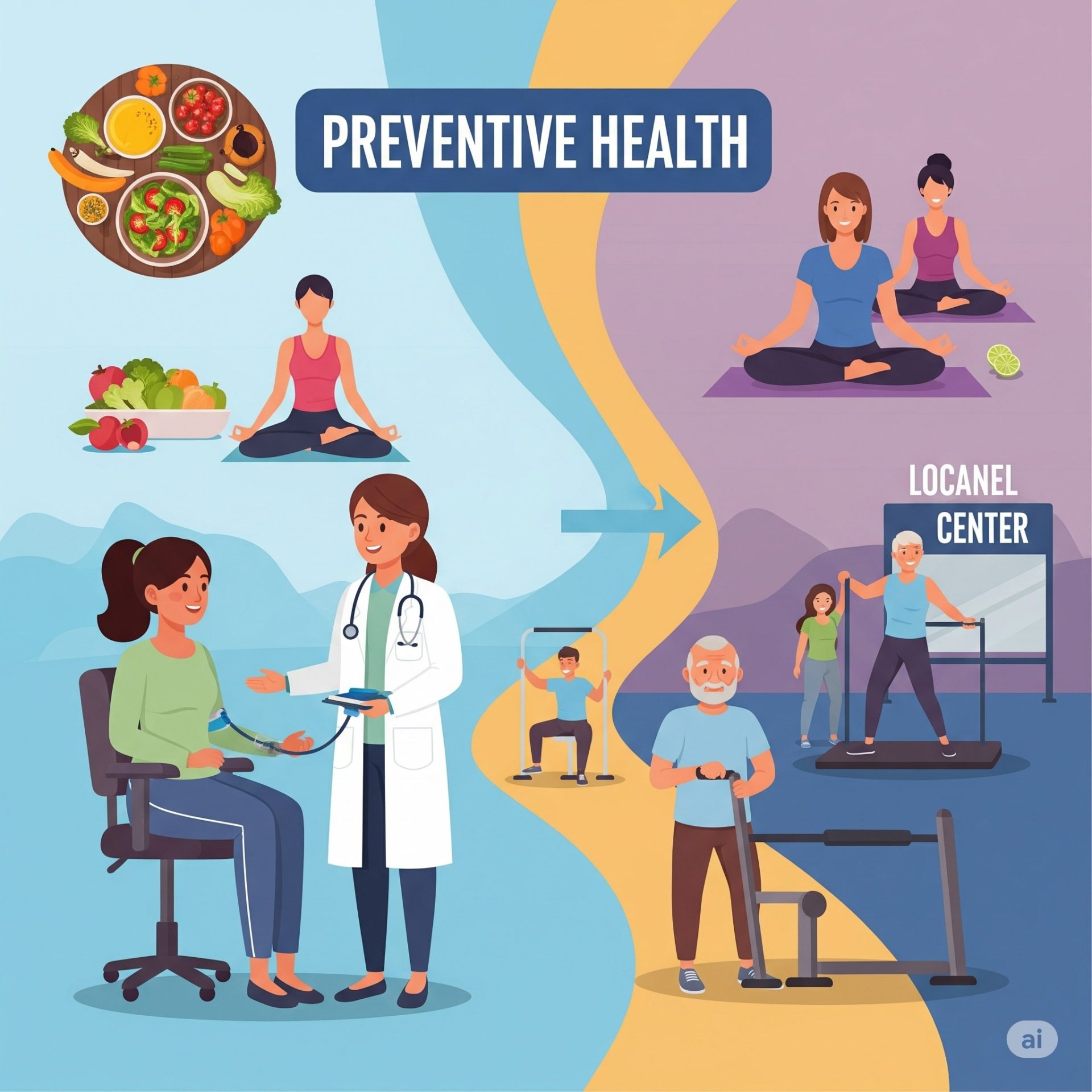Imagine a world where illnesses are intercepted well before they manifest, healthcare costs are substantially reduced, and everyone enjoys a prolonged, healthier life. Preventive health aspires to make this vision a reality by shifting the focus decisively from treatment to prevention, ensuring individuals sustain their well-being through proactive measures. This approach not only distinguishes itself from traditional diagnostic tests by emphasizing early intervention but also plays a crucial role in significantly minimizing the overall burden on the healthcare system.
The significance of preventive health is unequivocal. By investing diligently in regular health checkups, routine screenings, professionals can markedly decrease healthcare expenses, boost productivity, enhance the overall quality of life, and increase longevity. A comprehensive preventive health plan also considers family health history—a vital component that shapes personalized strategies aimed at mitigating hereditary health risks.
Embracing preventive health necessitates a collaborative partnership with healthcare providers to develop effective, individualized care plans. It also involves integrating employer-led initiatives in the workplace to robustly support employee well-being. This discussion explores the indispensable components of creating personal preventive health plans, detailing steps to assess personal health risks, establish achievable health goals, and adapt the plan over time to ensure a lifetime of good health and happiness.
Understanding Preventive Health
Preventive health is a crucial approach in modern healthcare that focuses on maintaining well-being and obstructing diseases before they occur. This proactive strategy emphasizes regular health checkups, and screenings, allowing individuals to detect potential health issues early and manage them effectively. Preventive health encompasses a broad spectrum of services and practices designed to keep people healthy and reduce the burden of chronic diseases. By prioritizing prevention, individuals can significantly lower their risk of severe illnesses and associated healthcare costs, emphasizing the importance of having a well-defined preventive health plan.
Definition of Preventive Health
Preventive health refers to the organized efforts aimed at improving health outcomes by preventing diseases, injuries, and complications before they occur. It includes a range of medical services and lifestyle interventions such as annual checkups, and preventive screenings that serve to identify potential risk factors for diseases. These proactive measures are essential in forestalling conditions like heart disease, diabetes, and various forms of cancer. Unlike curative health, which focuses on treating existing health issues, preventive health emphasizes actions and habits that preserve health and avert deterioration over time, ensuring a higher quality of life.
Difference Between Preventive and Diagnostic Tests
Preventive and diagnostic tests both play vital roles in healthcare, yet they serve distinct purposes. Preventive tests are designed to catch potential health issues before symptoms develop. They can be part of routine health assessments, including blood pressure screenings, cholesterol testing, and holistic methods of assessment aimed at reducing the risk of future illnesses. On the other hand, diagnostic tests are conducted after symptoms appear, to identify the specific causes of a health issue. These tests confirm or rule out conditions, thereby guiding further treatment. While preventive tests are generally more proactive, diagnostic tests are reactive, responding to existing health signals. Both, however, work synergistically to enhance overall health by early detection and timely intervention.
Importance of Preventive Health

Preventive health refers to taking proactive steps to maintain and improve health before problems arise. It plays a crucial role in fostering overall well-being and reducing the risk of chronic diseases. By prioritizing preventive care, individuals can catch potential health issues early through routine screenings, such as blood pressure checks, cholesterol testing, cancer screenings and holistic testing. Services like annual checkups and dental exams also fall under this category, offering a comprehensive overview of one’s health condition. These measures are not only crucial for detecting and addressing health problems promptly but also in promoting a healthier lifestyle overall. Engaging in preventive healthcare empowers individuals to take charge of their health, ensuring a proactive approach to well-being.
Reducing Healthcare Costs
Preventive health strategies can significantly reduce healthcare costs by minimizing the need for more extensive, higher-cost medical treatments. By participating in regular screening tests and preventive services, such as diabetes, cholesterol screening, and holistic testing methods individuals can identify issues well before they develop into costly health conditions. Free preventive services further reduce financial barriers, allowing more people access to necessary preventive screenings, like blood pressure screenings and mental health screenings. Health insurance often covers these preventive health services, bridging the gap between patient needs and cost. By promoting preventive healthcare, we can reduce the financial burden on both individuals and the healthcare system as a whole, making healthcare more affordable and sustainable long term.
Enhancing Productivity
Preventive health also plays a major role in enhancing productivity. When individuals maintain optimal health through regular screenings and preventive measures, they are less likely to suffer from debilitating illnesses that can lead to missed workdays and decreased efficiency. Health screenings and annual checkups are tools that ensure employees remain in their best shape. Maintaining good health means fewer sick days, translating to improved productivity at work. Similarly, mental health screenings address issues that could affect concentration and workplace morale. By cultivating a workforce that prioritizes health, businesses can experience increased productivity levels, positively impacting the overall economy.
Improving Quality of Life
Investing in preventive health through holistic methods tremendously improves the quality of life. Regular dental and vision screenings, along with other routine screenings, address issues before they escalate, ensuring that individuals experience vibrant health at every stage of life. Participating in biometric screenings keeps infectious diseases like seasonal flu at bay. By maintaining oral healthcare and identifying risk factors through services such as oral cancer screenings, individuals can enjoy everyday activities with fewer limitations and enhanced comfort. The peace of mind that comes with knowing one is healthy and equipped to handle future health challenges enhances overall life satisfaction and contentment.
Ensuring Longevity
Preventive health is a cornerstone in the pursuit of a longer, healthier life. Routine health screenings such as Pap tests, colorectal cancer screenings, and prostate-specific antigen tests can detect potentially life-threatening conditions early, significantly increasing treatment success rates. By addressing health risks early and following through with preventive measures, individuals are more likely to enjoy a prolonged, healthy life. These practices allow for increased longevity without sacrificing quality of life, thus making preventive health a valuable strategy for those seeking to extend and improve their lives.
Key Components of a Preventive Health Plan
A robust preventive health plan is an essential strategy for maintaining well-being and preventing diseases before they occur. By proactively engaging in health-promoting activities, individuals can significantly reduce the risk of chronic conditions such as heart disease and diabetes. A comprehensive plan typically involves regular checkups and a variety of routine screenings. Implementing such a plan allows for the early detection and management of potential health issues, contributing to a healthier, longer life.
Regular Health Checkups
Regular health checkups form the cornerstone of effective preventive healthcare. These annual visits enable healthcare providers to monitor an individual’s overall health and identify any early signs of potential health problems. During these appointments, physicians perform blood pressure checks, cholesterol testing, diabetes screenings, and holistic methods. Consistent checkups allow for the prompt detection and treatment of conditions before they develop into more serious problems. Additionally, these visits offer an opportunity to discuss lifestyle changes and mental health screenings, making them integral to a comprehensive health strategy.
Routine Screenings
Routine screenings are vital components of a preventive health plan, aimed at detecting health conditions early when they are most treatable. These screenings vary based on age, gender, and risk factors but commonly include cancer screenings such as colorectal cancer screenings and Pap tests for cervical health. Health screenings also encompass oral examinations, including dental exams and oral cancer screenings. Biometric screenings help track key health metrics, providing crucial data that informs health decisions. By staying on top of these routine checks, individuals increase their chances of early diagnosis and effective intervention, ultimately contributing to better health outcomes.
The Role of Family Health History
Understanding your family health history is a critical component in developing a comprehensive preventive healthcare plan. This information serves as a roadmap, highlighting potential health risks that may affect you and your future generations. By examining the medical histories of your relatives, you can gain valuable insights into conditions that might be inherited, such as heart disease, diabetes, or certain types of cancer. Incorporating family health history into your preventive care strategy can lead to earlier detection through screenings and proactive measures tailored to your specific needs. Recognizing these patterns enables healthcare providers to offer more personalized and effective preventive services.
Importance of Knowing Your Family Health History
Knowing your family health history is fundamental to making informed decisions about your preventive healthcare. This knowledge helps identify diseases that may occur in your family, which could be mitigated or managed through early intervention. For example, if multiple family members have had colorectal cancer, your healthcare provider may recommend routine colorectal cancer screenings earlier than typically advised. This proactive approach could significantly improve health outcomes and help you avoid serious health issues. Furthermore, a well-documented family health history may lead to eligibility for specific preventive services or screenings, which can in some cases, be free of charge.
How Family History Influences Preventive Strategies
Family history plays a pivotal role in shaping preventive health strategies by highlighting vulnerabilities and guiding screening tests and other preventive measures. If your family history indicates a predisposition to high blood pressure, regular blood pressure checks and lifestyle modifications can be emphasized to reduce risk. Moreover, a history of diabetes in your family may necessitate more frequent diabetes screenings and cholesterol testing to ensure early management. This proactive approach to preventive care also extends to mental health, where knowledge of familial occurrences of depression or anxiety can lead to earlier mental health screenings and interventions. Ultimately, being informed about your family’s health history allows for tailored preventive strategies that cater to your specific genetic risks, encouraging a healthier future for you and your family.
Working with Healthcare Providers
Collaborating effectively with healthcare providers is essential for achieving optimal health outcomes. This partnership forms the cornerstone of preventive healthcare, facilitating timely access to preventive services such as cancer screenings, routine screenings, and annual checkups. By engaging in open communication with healthcare providers, individuals can better navigate the healthcare system and receive preventive screenings and services tailored to their specific needs. Establishing a strong relationship with healthcare professionals ensures that one’s health plan is aligned with current health guidelines and personalized health goals. To maximize the benefits of preventive healthcare, it is crucial to understand the dynamics of building a personalized care plan and cultivating a comprehensive approach to preventing illnesses.
Building a Partnership for Personalized Care
Building a partnership with healthcare providers begins with clear and open communication. Patients should feel empowered to ask questions, express concerns, and share their personal and family medical history. This exchange of information allows healthcare providers to offer bespoke advice on essential preventive services, such as cholesterol testing, diabetes screening, and blood pressure checks. Another essential element of this partnership is trust. Establishing trust encourages active participation in one’s health journey, leading to better adherence to recommended health screenings and preventive measures. Finally, both parties should agree on goals and priorities, which facilitates a shared understanding of the individual’s health aspirations and the necessary steps to achieve them.
Healthcare providers bring valuable expertise to the table, helping to interpret the results of screenings and tests like colorectal cancer screenings and Pap tests. This expertise is crucial for making informed decisions about the course of preventive care. Additionally, healthcare providers can offer guidance on lifestyle changes that support overall health, such as addressing risk factors for heart disease or managing conditions such as diabetes. This collaborative approach ensures that care plans are not only effective but also realistic and sustainable.
Moreover, incorporating technology into this partnership can enhance communication. Many healthcare systems offer online portals where patients can access their medical records, schedule appointments, and communicate with their providers. Utilizing these tools keeps patients engaged and informed, promoting a proactive approach to preventive healthcare. Ultimately, a strong partnership for personalized care relies on mutual respect and commitment from both the healthcare provider and the patient.
Developing Comprehensive Preventive Plans
Creating a comprehensive preventive health plan involves identifying individual health risks and setting tailored preventive measures. This personalized approach helps in prioritizing health screenings and preventive services most relevant to an individual’s unique health profile. For example, individuals at risk for specific conditions like prostate cancer or seasonal flu may require more frequent or specialized screenings, such as the methodologies of holistic health and prostate-specific antigen tests.
The foundation of a thorough preventive plan is regular screening tests and checkups. Regular bio-metric screenings, including cholesterol and blood pressure checks, provide crucial insights into one’s health status, allowing for timely interventions. Furthermore, routine dental and vision screenings, as well as oral cancer screenings and comprehensive dental exams, guard against health issues that can significantly impact quality of life if left unchecked.
Preventive health plans should also encompass mental health screenings to address emotional and psychological well-being. Identifying mental health concerns early can prevent them from escalating into more severe conditions.
Finally, developing a preventive plan involves revisiting and updating it as health needs change over time. This dynamic approach ensures that the preventive measures remain relevant and effective. With the guidance of knowledgeable healthcare providers, individuals can stay ahead of potential health issues, ultimately enhancing long-term health and vitality. Implementing a comprehensive preventive plan is not merely about avoiding disease but fostering a healthier, more balanced life.
Implementing Preventive Health Plans at Workplaces
As the awareness around preventive health grows, workplaces are stepping up to play an active role in the health and well-being of their employees. By integrating preventive health plans into the workplace, employers can contribute significantly to the prevention of chronic diseases and the early detection of potential health issues. Preventive health services, such as routine screenings and annual checkups, become more accessible when provided on-site or through employer-supported programs. These initiatives not only enhance the health standards within the organization but also cultivate a culture of health awareness and proactive management. Implementing these plans requires strategic efforts and commitment from both employers and employees.
Employer-Led Health Initiatives
Employer-led health initiatives are crucial in fostering a supportive environment that prioritizes employee well-being. Through organized health screenings, such as biometric screenings, blood pressure checks, and cholesterol testing, employers can help employees stay aware of their health metrics. By also offering dental and vision screenings, including oral cancer screenings, companies address important aspects of personal health that might otherwise be neglected due to busy schedules.
Employers can further enhance their initiatives by partnering with healthcare providers to ensure easier access to routine and preventive screenings. For example, employers can facilitate mobile clinics that provide on-site Pap tests, diabetes screening, colorectal cancer tests and support appointments with health coaches and practitioners. Integrating these health services into the workplace makes it convenient for employees to utilize them without the stress of scheduling and travel. Ultimately, these proactive steps demonstrate a commitment to employee health, contributing to a more engaged, healthy, and productive workforce.
Benefits to Employees and Employers
Preventive health plans offer mutually beneficial outcomes for both employees and employers. Employees gain access to vital health services that help in the early detection and prevention of serious health issues, such as heart disease or cancer, preventing the potential for severe future complications. Regular checkups, mental health screenings, and a comprehensive approach to preventive care empower employees to take control of their well-being and make informed health decisions.
For employers, the implementation of preventive health plans can lead to reduced healthcare costs and decreased absenteeism. By investing in preventive measures, companies can lower the incidence of long-term health problems among employees, resulting in fewer insurance claims and lower medical expenses. Moreover, such healthcare initiatives often boost morale, increase job satisfaction, and improve employee retention rates. The proactive emphasis on health also helps in creating a positive workplace culture, ultimately contributing to a more resilient and productive organization. The shared focus on preventive healthcare lays the foundation for a thriving workplace where both employees and employers benefit from improved health outcomes and a more harmonious work environment.
Steps to Create a Personal Preventive Health Plan
Creating a personal preventive health plan is essential for maintaining overall well-being and reducing the risk of serious illnesses. Preventive healthcare involves identifying potential health risks and addressing them proactively through appropriate screenings and lifestyle modifications. A well-crafted plan can include regular preventive services such as cancer screenings, blood pressure checks, and dental exams, ensuring that all aspects of your health are consistently monitored. By focusing on these preventive measures, you can detect potential health issues early and take measures to prevent them from developing into serious conditions. Implementing a structured health plan not only enhances the quality of life but also offers peace of mind, knowing you are taking proactive steps for your health.
Assessing Personal Health Risks
Assessing personal health risks is the first crucial step in creating a tailored preventive health plan. Understanding your individual risk factors—such as age, family history, lifestyle, and pre-existing medical conditions—can guide you in prioritizing necessary preventive services. For example, individuals with a family history of colorectal cancer might be prompted to schedule more frequent cancer screenings. Similarly, those with a sedentary lifestyle may need regular cholesterol testing and heart disease screenings. By identifying these risks early on, you can discuss with your healthcare provider which screening tests like diabetes screening, Pap tests, or biometric screenings are most appropriate and necessary. Engaging in this initial assessment allows you to make informed decisions about your health, thereby reducing the risk of preventable diseases.
Setting Health and Wellness Goals
Once you have assessed your health risks, the next step is to set clear and achievable health and wellness goals. These goals should be individualized and realistic, reflecting both your immediate and long-term health needs. For instance, if your biometric screenings reveal elevated blood pressure, a suitable goal might be to incorporate regular cardiovascular exercise and a balanced diet into your routine. Setting specific, measurable targets—such as losing a certain amount of weight or reducing stress levels—can help track your progress and maintain motivation. Additionally, goals should not only focus on physical health but also consider mental well-being, encouraging practices like meditation or counseling when necessary. With well-defined goals, you can create a structured health plan that promotes overall wellness and longevity.
Monitoring and Adjusting the Plan Regularly
Regular monitoring and adjustment of your preventive health plan are vital to accommodate any changes in your health status or lifestyle. Health is not static, and factors such as age, new medical developments, or lifestyle changes necessitate periodic evaluation of your plan’s effectiveness. Routine screenings like annual checkups, dental and vision screenings, and mental health evaluations should be scheduled to keep track of your health progress. Regularly reviewing and adjusting your plan ensures it remains relevant and targeted towards your current needs, providing a dynamic and responsive approach to maintaining your health. This proactive stance enables you to swiftly address any deviations, ensuring ongoing optimal health and well-being.
Promoting Overall Well-being through Preventive Health
Promoting overall well-being begins with a focus on preventive health care, which involves taking proactive steps to maintain good health and prevent illness. By integrating preventive health services such as routine screenings and annual checkups into your lifestyle, you can detect potential health issues early before they become more serious problems. Embracing preventative health also means considering free preventive services like cancer screenings and dental exams. These services are essential in helping you stay healthy and are often covered by insurance plans to encourage regular use. Developing a personalized prevention plan is integral to sustaining your health and well-being, ensuring you remain in control of your health journey by staying informed and proactive.
Supporting an Active Lifestyle
Physical activity is a cornerstone of preventive health, playing a crucial role in maintaining physical fitness, reducing the risk of chronic diseases, and enhancing mental well-being. An active lifestyle doesn’t require the gym membership; simple activities like walking, cycling, or engaging in recreational sports can significantly benefit your health. By including regular exercise in your daily routine, you can improve cardiovascular health, maintain a healthy weight, and boost your mood.
Exercise also aids in preventing diseases like heart disease and diabetes, and it may reduce the risk of developing some cancers. Engaging in moderate to intense physical activity helps lower blood pressure, improves cholesterol levels, and supports immune function. Incorporating a variety of exercises—such as strength training, flexibility exercises, and aerobic activities—not only ensures comprehensive health benefits but also keeps your fitness routine engaging.
Managing Stress Effectively
Stress management is vital for maintaining mental and physical health, as prolonged stress can contribute to numerous health issues like heart disease, depression, and a weakened immune system. Effective stress management begins with identifying stressors and finding practical coping mechanisms. Techniques such as mindfulness meditation, deep-breathing exercises, yoga, and holistic techniques for releasing stress can promote relaxation and mental clarity.
Creating a balanced lifestyle is also essential for stress reduction. Ensuring adequate rest, maintaining a nutritious diet, and fostering positive social interactions are critical components. It’s helpful to create boundaries between work and personal life, allowing time for activities that bring joy and satisfaction. When stress becomes overwhelming, seeking professional support from counselors or therapists can provide valuable coping strategies and emotional support.
Encouraging Dental and Vision Health
Oral and vision health are often overlooked components of preventive healthcare, yet they are vital for overall well-being. Regular dental exams and oral cancer screenings can catch early signs of issues such as cavities, gum disease, or oral cancer, conditions that if neglected, can lead to more severe health problems. Similarly, routine vision screenings help detect changes in vision and eye health issues before they evolve into major concerns.
Preventive measures in dental health include brushing teeth twice a day, flossing daily, and keeping up with scheduled dental checkups. For vision health, wearing protective eyewear, managing screen time, and maintaining a diet rich in vision-supporting nutrients are beneficial practices. Routine screenings for dental and vision health are essential, not only for maintaining these aspects but also for enhancing the quality of life, allowing you to engage more fully in daily activities without hindrance.










